#62: Stranded In The Jungle by the Cadets
City: Edmonton, AB
Radio Station: CFRN
Peak Month: September 1956
Peak Position in Edmonton ~ #2
Peak position in Vancouver ~ did not chart
Peak Position on Billboard Hot 100 ~ #15
Peak Position on the Cashbox R&B Singles ~ #10
YouTube: “Stranded In The Jungle”
Lyrics: “Stranded In The Jungle”
In the late 1940s, a gospel group formed in the Los Angeles area named the Santa Monica Soul Seekers. The members were Lloyd McCraw, Willie Davis, Austin “Ted” Taylor, Aaron Collins, Glendon Kingsby, and Will “Dub” Jones. Aaron Collins was born in Arkansas in 1930, and in his teens moved to Michigan to sing in a gospel group for three years. Collins next moved to Los Angeles in the late 40s to join the Santa Monica Soul Seekers. In 1955, the group auditioned with Modern Records and got a contract. They decided to switch their style from gospel to R&B. The decision led Glendon Kingsby to leave the group. The record label came up with the name The Cadets. A single was released which was a cover of the Nappy Brown song “Don’t Be Angry”. They also released a single titled “Why Don’t You Write Me?”, which was a cover of a song by the Feathers. Modern was concerned the two released would compete with each other. So, “Why Don’t You Write Me?” was credited to The Jacks (even though it was the same group). The single peaked at #3 on the Cashbox R&B Singles chart in 1955. It earned them a spot on a tour sharing the stage with Ruth Brown, T-Bone Walker, Etta James, and the Orioles.
The Cadets continued to release four more singles in 1955 on the Modern label, and the Jacks also released four singles on the RPM label. One of the singles the Cadets released in 1955 was “Annie Met Henry”. Though they hoped to build on the popular songs about Annie and Henry by Hank Ballard and the Midnighters, the bouncy single with a solid saxophone interlude didn’t get proper promotion.
The group continued to tour in 1955, landing on stage alongside Joe Williams, Bill Dogged, Howling Wolf, Bo Diddley, the Flamingoes and the Heartbeats.
Lloyd McCraw left the Cadets/Jacks lineup at the end of 1955, and became their manager. He was replaced by Pete Foxx. In the spring of ’56, Ted Taylor left the group for awhile and was replaced by Prentice Moreland (born in 1925 in East St. Louis, IL).
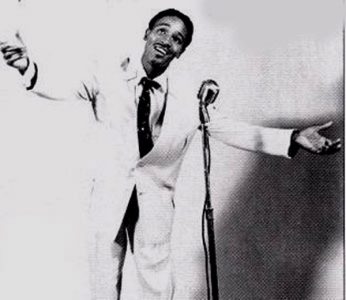
Prentice Moreland, who gave the Cadets a spontaneous
line during the recording of “Stranded In The Jungle”
In January 1956, Aaron Collins brought his sisters, Betty and Rose Collins, to the recording studio. They recorded as the Teen Queens and “Eddie My Love” was released. The single climbed to #3 on the R&B charts and #14 on the Billboard Pop chart in March ’56. The song was covered by the Fontaine Sisters and the Chordettes. In January 1956, the Jacks appeared on Gene Norman’s Campus Club on KHJ-TV, singing both songs released in 1955 by the Cadets and the Jacks. In February ’56, the Cadets recorded a cover of the Elvis Presley chart-topper, “Heartbreak Hotel”.
The group signed up to the Buck Ram management agency in March 1956, and continued churning out singles. In May 1956 a group called the Jayhawks released a single titled “Stranded In The Jungle”. (Like the Cadets, the Jayhawks also recorded under other group names: the Vibrations and the Marathons). The Jayhawks recording was a rather straightforward telling of this novelty song. The Cadets decided to record a more exaggerated version of “Stranded In The Jungle”.
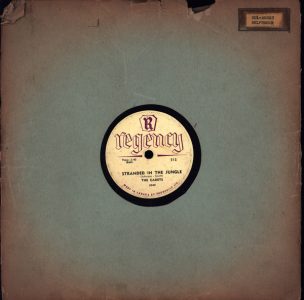
“Stranded In The Jungle” was written by Ernestine Smith, and the Jayhawks first tenor, James Johnson. The song concerns a boyfriend who is in a plane that crashes in a jungle. The plane crash has been picked up and spotted by the authorities. But meanwhile, his girlfriend “back in the States” is being wooed by other suitors. They tell her, “Baby, baby, let’s make romance. You know, your old-time lover hasn’t got a chance. He’s stranded in the jungle… so come on pretty baby, just you and me.” Between 1950 and the spring of 1956, about 40 commercial planes had crashed in the United States. This is equal to about one plane crash reported in the news every two months. So, the inspiration to write lyrics that involve a plane crash as a catalyst for the boyfriend’s predicament got many people playing the jukebox interested.
Back in the jungle, the boyfriend is being chased by “the boys in the jungle” who hit him with something heavy “like an atomic bomb.” He wakes up to find himself in a cooking pot and figures out he’s been captured by cannibals. In the Cadets’ version of the song, singer Prentice Moreland exclaims in response to learning that the boyfriend in the jungle is in a pot that cannibals are cooking him in, “Great Googa Mooga! Lemme outta here!” Perhaps, “great googa mooga” is intended to be an invocation of a voodoo diety, or idol. Or, it’s meant as an exclamation of dismay, like “Great Caesar’s Ghost” as Clark Kent’s boss at the Daily Planet used to say in the cartoon comics. In 1968, the Temptations recorded a song titled “Ball Of Confusion”. The song comments on the world today: racism, violence, riots, record levels of prescription drugs, war, pollution, taxation, and hippies. In light of all that is unfolding the Temptations sing in the chorus “Great googamooga, can’t you hear me talking to you?” In addition, in the 1960s Lee Dorsey recorded a track titled “Great Googamooga”.
(Prentice Moreland had previously been singing with the Du Droppers, the Dominoes, and the Hollywood Flames. He never seemed to stay with any of these other doo-wop groups for long, and this was also the case with the Cadets).
In the 1950s there were reports in the news of some cases of cannibalism in different countries in Africa, Asia and islands in the Pacific. An investigative report about the Fore people who numbered 11,000 people in New Guinea in the 1950s is one example. Decades later, NPR recalled investigators found that there was a practice of “eating dead bodies at funerals. In many villages, when a person died, they would be cooked and consumed. It was an act of love and grief.”
On July 4, 2012, there was a story in the news about an alleged cannibal cult of 29 people who were responsible for the deaths of seven people in Papau New Guinea. A raid took place in Bram village on the north coast of the island. Authorities were seeking information for two men who were on the run, purported to be the ringleaders involved in sorcery.
The boyfriend jumps out of the pot and runs away from the cannibals. He jumps in the ocean and starts to swim. He hitches a ride with a whale who gets him to the ‘States in half a day. He is wiped out, but pleads with his girlfriend to come back to him now that he’s home again. Will “Dub” Jones was the bass vocalist narrator for the Cadets on this song.
In a case of misheard (or misunderstood) lyrics, the Cadets bungled a line in the Jayhawks “Stranded in the Jungle”. In the original, the Jayhawks sang, “but I saw what was goin’ on.” This was to indicate the boyfriend who’d returned from the jungle to the ‘States understood other guys were making advances on his girlfriend. However, the Cadets sang “but my soul was gone.” This lyrical misadventure could lead listeners to think the boyfriend was so traumatized from being in a cooking pot surrounded by cannibals – after being knocked unconscious by “the boys in the jungle” – that his soul was gone (lost) perhaps still back in the jungle.
In another misheard lyrics twist, the Jayhawks original version of “Stranded in the Jungle” contained this line: “But how was I to know that the wreckage of my plane had been fixed up by my partner who had my girl in Lovers Lane.” In this case, we can deduce that the plane crash is the result of the boyfriends’ buddy/partner having “fixed” the plane – not so it would run smoothly on its next flight, but “fixed” it so that it would crash. And once the boyfriend’s partner had done away with the boyfriend, he’d move in on the girlfriend. The reference to “Lovers Lane,” dates back to the 1850s where people would pair up and start to kiss, make out, or engage in sexual activity. The lovers lanes were secluded areas, either urban or rural. The Cadets sang these words instead, “But how was I to know that the wreckage of my plane had been picked up and spotted, and my girl in Lovers Lane.” The plot thickens.
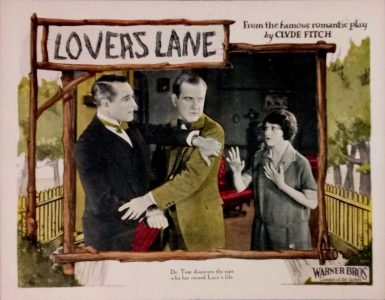
1924 silent film, Lovers Lane, based on a play of the same name
“Stranded In The Jungle” peaked at #2 in Edmonton, Albany (NY), Kansas City (MO), #4 in Nashville and Avalon (CA), #5 in Pittsburgh, Blytheville (AR) and Fort Worth (TX), #6 in Troy (NY), #8 in Rice Lake (WI) and Memphis, #9 in Tucson (AZ) and Albuquerque (NM), #10 in Clearwater (FL), #13 in Minneapolis/St. Paul, and #14 in New York City and Milwaukee (WI).
The Jayhawks original of “Stranded in the Jungle” climbed to #18 on the Billboard Pop chart. The Cadets cover reached #15 on the pop chart, and #3 on the Billboard R&B chart. The Gadabouts cover had a narrator who sounds like Popeye. The version sounds like a “white” cover version, along the lines of other covers by white recording artists of black recording artists at the time. They stalled at #39 on the Billboard Pop chart. The Jayhawks re-recorded “Stranded In The Jungle” credited to the Vibrations in 1961. This time the single stalled at #117 beneath the Hot 100. Subsequent recordings of “Stranded In The Jungle” include those by Shorty Long, Commander Cody and His Lost Planet Airmen, Frank Zappa, the Nylons, and the New York Dolls.
The group continued recording under both the Cadets and the Jacks, but toured only as The Cadets. They would, however, perform Jacks songs onstage. Aaron Collins was drafted in the summer of ’56. His place taken for a short time by the returning Ted Taylor. After only a matter of weeks, Collins was able to return to the group having been able to somehow get out of the U.S. Army (failing the fitness test on purpose?), and Taylor was back out.
In 1957 there were albums released under both the Jacks and Cadets names, under Modern and RPM, respectively. The Cadets released Rockin’ ‘n Reelin’.
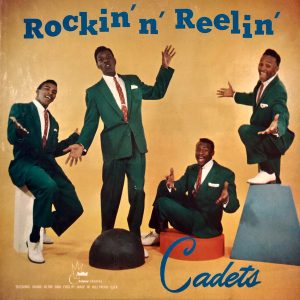
The liner notes effused:
Though the single vocalist has always reigned supreme in the recording field, the coming of rock N roll has helped vocal combos make tremendous inroads in popularity. Riding on top of this new rhythm, in the very front seat of the speeding Rock N’ Roller coaster are perched The Cadets, a singing, swinging vocal group who have shot into stardom like an earthbound comet.
From the disc jockey shows and from the juke boxes their hits like “Stranded in the Jungle” and “Heartbreak Hotel” have resounded across the country with record-smashing impact. The fire and excitement of their performances have left night club, theater and TV audiences limp and breathless, gasping for more.
We are proud to present their first LP album. The selections highlight The Cadets’ earthy, beat-rich, blues bawling, their vigorous singing style peppered with plenty of foot-stomping and lyric-punching dramatics. For the most part, these sides showcase a big, booming bass voice that blend with lusher, more melodic voices… a sound that gives the group its unique character. The clever novelty touch expressed by these four talented young lads is best seen in their quick rhythmic changes and voicing on “Stranded in the Jungle” … and the group’s never-flagging, pulse-like beat shows up especially well in their swinging, shuffle-boogie interpretation of “I Want You”.
Confusing to many was the use of Cadets tracks on the Jacks album, and vice versa. In February 1957, the album Jumpin’ With The Jacks was released. The liner notes for the Cadets other alias read:
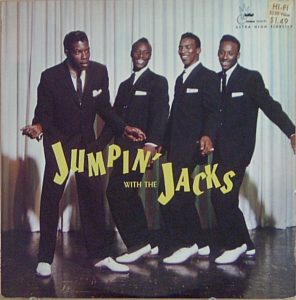
Considering that there are about a quarter of a million new songs written every year, and that only about 100 of them ever reach any real measure of recording popularity, we can assume that its pretty tough for new artists to crash the golden gate into immediate stardom. Yet, through their distinctive vocal styling, this is what The Jacks have done in the past year. They are a bright new singing group whose popularity has snowballed overnight so suddenly, in fact, it was difficult for Crown Records to release their first LP album fast enough.
In 1957 the Cadets/the Jacks stopped touring, without any big hits since “Stranded In the Jungle”. In May 1957, there was a single release by “Aaron Collins and the Cadets”, which was Collins backed by white studio singers. In November, the four were back (Collins, Taylor, Foxx and Davis) together for one more release.
At the end of the year, the group split. Collins and Davis joined The Flairs. Pete Foxx became a guitar instructor for the next five and a half decades into 2011 (at least). Foxx gave guitar lessons out of his studio in Los Angeles. Dub Jones joined The Coasters in time to join in on the recording of “Yakety Yak”, “Charlie Brown” and “Poison Ivy”. In 1958, Willie Davis became the lead singer of the Rocketeers.
A few recordings were made with the Cadets name in 1960. However, this was effectively recorded by Willie Davis and Aaron Collins with the Flairs. They had a #20 hit on the R&B chart in 1961 with “Foot Stompin’ Part 1”. Aaron Collins went on to run a shoe repair business in Los Angeles. He died in 1997 at the age of 66. In the 1970s, Will “Dub” Jones performed with groups such as “The Zion Travelers” gospel singers.
In 1987, Ted Taylor died at the age of 53 in a car crash after having a successful career as a performer which included being part of the Mighty Clouds of Joy. In 1988, Prentice Moreland died at the age of 63. In 2001, while rehearsing for a show with the Doo Wop Society of Southern California, Dub Jones had to be rushed to the hospital, having suffered a stroke. He died thirteen months later in 2002 (according to Wikipedia, but other websites state he died in 2000).
Willie Davis died in 2011 from complications due to Alzheimer’s Disease.
October 30, 2023
Ray McGinnis
References:
Marv Goldberg, “The Jacks/Cadets,” uncamarvy.com, 2003, 2009.
“The Cadets,” concert dates at the Apollo Theater, Harlem, NY, September 28 to October 4, 1956, setlist.fm.
Temptations, “Ball Of Confusion“, Motown, 1968.
“Cannibal Cult Members Arrested in PNG,” New Zealand Herald, July 4, 2012.
Rae, Ellen Bichell, “When People Ate People, A Strange Disease Emerged,” NPR, September 6, 2016.
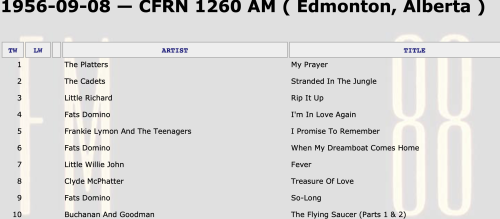
CFRN, Edmonton (AB), September 8, 1956

Leave a Reply